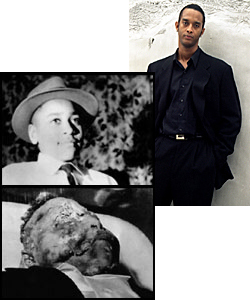
An Interview with Filmmaker Keith Beauchamp on the Untold Story of Emmett Louis Till
“I'm going to make an example of you”
- J.W. Milam to Emmett Till
Today marks the birthday of Emmett Till (born July 25, 1941), the 14-year-old boy from the south side of Chicago who was brutally murdered during the summer of 1955 while on a family visit in Mississippi in the U.S. deep south. His crime? He was accused of whistling at a White woman. The woman in question was Carolyn Bryant, the young wife of a general store owner, Roy Bryant, in the tiny town of Money, Mississippi. Three days later, at 2 am, Emmett Till was dragged from his bed where he slept with his cousin Simeon by Roy Brant and his half-brother John W. Milam. Following a vicious beating, his body was dumped in the Tallahatchie River tied to a seventy-five-pound gin fan. The slaying left him completely disfigured. The two men were arrested and brought to trial for Till’s murder, but they were both acquitted by an all-White jury that deliberated for only an hour.
Recently, Afrotoronto.com had the chance to speak with 34-year-old filmmaker Keith Beauchamp who took nine years of his life to produce a documentary about Emmett Till’s story. His documentary film, The Untold Story of Emmett Louis Till, had the landmark effect of leading the United States Department of Justice to re-open the half-century-old murder case on May 10th, 2004.
As Keith Beauchamp, the Baton Rouge, Louisiana native, told AfroToronto.com: “The case itself is a major part of African-American history. Emmett Till is our Anne Frank. It’s not just an African-American story, it’s an international story as well. This case was covered internationally in 1955. So many people heard about the atrocities being done against African-Americans in this country … but no one ever had the opportunity to see the face of the victim.”
Beauchamp first became focused on the story of Emmett Till at ten years old. “I was in my parents’ study, and I came across an issue of Jet Magazine. It covered his murder trial in 1955. And like many of us who saw that photograph, this was a historical event. Jet Magazine had a major involvement in bringing that story to the world. Because they had pictures of the open casket funeral ... I saw that photograph and I could never get that image out of my head. I was so amazed as a 10-year-old (looking at a 14-year-old boy). Basically, it was a reflection of myself. … Looking at someone brutally murdered for the simple act of whistling. My parents came right at that moment, as soon as I pulled it out, they came in and saw me looking at that photograph and they began to tell me the story. So most of my life I was always fascinated with that case. I knew that at some point, that case was going to be a major part of my make-up.”
Another event years later would also solidify Keith Beauchamp’s calling and relationship with the story of Emmett Till. In 1989, while at a nightclub with some friends, a white lady friend of his happened to be there as well. She gestured to him to come dance with her. At that point, a bouncer grabbed him and hurled insults at him, telling him to “stick to his own kind.” The bouncer later called a plain-clothed policeman, and the confrontation between Beauchamp and the police became physical. He suffered beatings while being handcuffed to a chair once taken to the police station. He was only released after the policemen realized that his best friend, who was with him at the club and also arrested, was the son of a major at the local Sheriff’s department.
“That was a huge episode in my life. One of the catalysts why I tackled the Emmett Till case. I felt there was a way for me to have some type of control over racism and fighting and combating racism,” says Keith Beauchamp. He thought of getting involved in the system somehow by becoming a police officer or by becoming some kind of legal representative to really address these issues when it comes to injustice towards people of colour. So he began to study criminal justice while attending college in Baton Rouge, hoping to become a Civil Rights attorney. But during his junior year, he left university to join two of his childhood friends who went to New York city to work in film. The rest, as they say, is history.
While in New York, he had the opportunity to participate in music video productions. He began to produce, direct, and write music videos. With his accumulated experience, he decided to dedicate his time to his life’s calling by getting to work on a film about the murder of Emmett Till. Originally, he had a feature film in mind, but as the project evolved, it became clear that the most effective and immediate way to effect the change he sought would be through a documentary.
He felt in order to make the film authentic, he had to get the family of Emmett Till involved and track down those who were eye-witnesses to the events surrounding the murder. One of the first persons he sought out was Emmett Till’s mother, Mrs Mamie Till-Mobley. Beauchamp admits to AfroToronto.com that he was initially very nervous at the thought of contacting her. Would he bring back old wounds? How would she react? But he knew Mrs Mobley had to be an integral part of his film project. As Keith Beauchamp recounts: “I was very close to my mother. And Emmett Till was very close to his mom. … I felt comfortable in getting her involved, but it didn’t come easy. … I just wanted to be really sincere about approaching her, and eventually, she picked up the phone, and I hung up in her face. I was just so afraid. I couldn’t even talk. It took me a whole day to get the courage to call her. And the following day, I called her.” She picked up, he introduced himself and apologized for hanging up on her the day before.
“She was just so captivated. She was amazed that someone so young [because I was 23 at the time] would be so interested in her son’s story. And that began our friendship. In the beginning stages of my film, I lost my grandmother, and she kind of filled that void for me. So we became very close. We talked 4 or 5 times a day, and she began to be that angel on my shoulder. … This woman, to me, was the mother of the Civil Rights Movement. She never got the recognition that she deserves.”
We go on to discuss how central the Emmett Till murder case was to the entire Civil Rights Movement. Too few people know that Emmett Till’s mother, Mrs Mamie Till-Mobley, was best friends with Rosa Parks. The Emmett Till case, as Keith Beauchamp rightly states, was “foremost in Rosa Parks’ mind” when she refused to give up her seat on the bus, thus triggering the Montgomery bus boycott in Alabama. There was really a climate of defiance against the injustice engendered by the Emmett Till case, which Rosa Parks was definitely guided by. Martin Luther King, who happened to be the pastor at Rosa Parks’ church then took on the lead of the peaceful resistance.
It was only because of the courageous act of Emmett Till’s mother, who insisted on an open-casket funeral in defiance of local officials who wished to keep it closed, that a spark was ignited in the souls of the oppressed African Americans of the deep South. The movement not only spread nationally but internationally as well. “We can talk about the context of this story, the history of this story, and why it’s so important. It played a major role in the rise of the American Civil Rights Movement,” says Keith Beauchamp.
Visit Keith Beauchamp''s website, www.emmetttillstory.com, for more information about "The Untold Story of Emmett Louis Till" and the renewed investigation of the 1955 murder.




